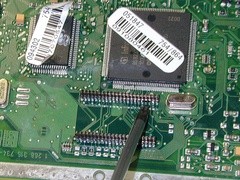The Volkswagen 1.8T engine is a popular choice for its blend of performance and efficiency. However, with the right modifications, you can significantly enhance its power output. This guide explores various tuning stages for your 1.8T, from basic upgrades to advanced modifications for serious horsepower gains.
Stage 1: Basic Tuning for Your Volkswagen 1.8T
The Volkswagen 1.8T responds well to basic tuning. A simple ECU chip upgrade combined with a larger diameter exhaust system can yield substantial power increases. 150-horsepower versions can often reach around 190 horsepower at the crankshaft with these modifications. The 180-horsepower variants will see a smaller proportional gain, reaching a similar power level due to their higher factory tuning.
However, there are exceptions. The New Beetle’s 1.8T, with its smaller turbocharger, intercooler, and injectors, is not recommended for significant tuning beyond stock levels. Similarly, the 225-horsepower Audi TT engine, already highly tuned from the factory, presents a challenge for significant improvement.
Most reputable ECU chip tuners offer various stages of tune, ensuring compatibility with your engine’s modifications. When upgrading the exhaust, a larger diameter system is generally beneficial for turbocharged engines, potentially unlocking up to 20 horsepower on high-boost setups. The trade-off for increased performance is a louder exhaust note.
Surprisingly, the stock Volkswagen airbox is quite efficient and doesn’t typically restrict performance at reasonable power levels. A high-quality air filter is sufficient. While the stock intercooler is adequate, it can heat soak quickly under heavy load. Upgrading to a larger front-mount intercooler ensures consistent performance during spirited driving.
Stage 2: Advanced Tuning for the Volkswagen 1.8T
For more significant power gains, upgrading the turbocharger and injectors is necessary. The stock K03 turbocharger is generally reliable up to around 250 horsepower at the crankshaft. While the stock Audi TT turbocharger offers slightly more headroom, aftermarket turbo upgrade kits, such as GT35/GT40 kits, provide a better value proposition, potentially pushing the engine to the limits of its stock internal components, around 300 horsepower.
The stock fuel injectors become a limiting factor around 210 horsepower. Upgrading to larger injectors, along with a corresponding ECU tune, allows the engine to reach the 300 horsepower mark. Beyond this point, the factory ECU becomes a constraint. Aftermarket standalone ECUs offer greater flexibility and cost-effectiveness for high-horsepower applications requiring custom tuning.
Stage 3: Building the Bottom End of the Volkswagen 1.8T
If 300 horsepower isn’t enough, increasing the engine’s displacement and strengthening the bottom end are the next steps. One approach involves using forged pistons and connecting rods with the stock crankshaft. A 1.9-liter upgrade with forged pistons, a 9.0:1 compression ratio, a larger turbocharger, and a tubular exhaust manifold can handle boost pressures up to 30 psi. Further enhancements include upgraded camshafts and intake porting.
For even higher power goals, a 2.0-liter crankshaft can be installed in the 1.8T block, creating a 2.0T engine capable of producing over 500 horsepower.
Considerations for the Drivetrain of a Tuned Volkswagen 1.8T
With significant power increases, upgrading the drivetrain is crucial. The stock clutch is often the weakest link and will likely require replacement after a turbocharger upgrade. The factory transmission is generally robust with a stronger clutch, but its lifespan is heavily influenced by driving style. While not as prone to failure as older Volkswagen five-speed transmissions, the factory gearbox might require reinforcement for extreme power levels. Audi gearboxes are generally stronger alternatives.
By strategically modifying your Volkswagen 1.8T, you can unlock impressive performance. As with any tuning project, careful planning and quality components are essential for achieving reliable and satisfying results.


